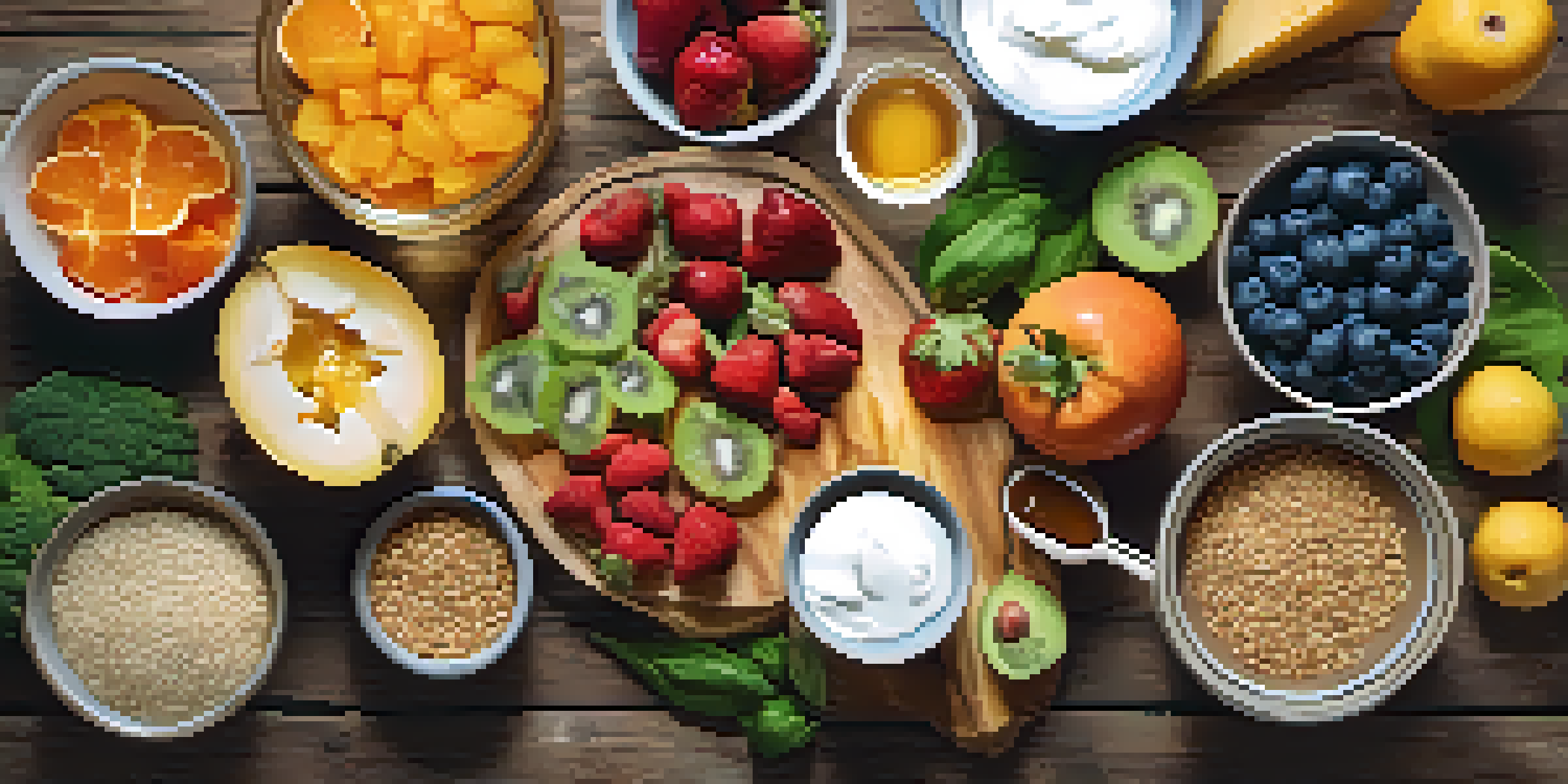Dietary Choices: Foods That Promote Gut Health Naturally

Understanding Gut Health and Its Importance
Gut health is crucial for overall well-being, influencing everything from digestion to immunity. The gut microbiome, a collection of trillions of microorganisms, plays a vital role in maintaining this balance. When our gut flora is healthy, we feel energized and our bodies function optimally.
All disease begins in the gut.
However, factors like poor diet, stress, and lack of sleep can disrupt this delicate ecosystem. This imbalance may lead to digestive issues, inflammation, and even mood swings. By focusing on dietary choices, we can promote a thriving gut environment.
In this article, we’ll explore various foods that naturally support gut health, helping you make informed dietary choices. Whether you’re looking to improve digestion or enhance overall wellness, understanding these foods is a great starting point.
The Power of Probiotics for Gut Balance
Probiotics are live bacteria that are beneficial for your digestive system. These friendly microbes can be found in fermented foods like yogurt, kefir, and sauerkraut. Consuming probiotics can help restore balance to your gut microbiome, especially after taking antibiotics or experiencing digestive upset.

When you include probiotics in your diet, they can outcompete harmful bacteria, leading to better digestion and improved nutrient absorption. This can also help alleviate symptoms like bloating or gas that many people experience. So, think of probiotics as your gut's little helpers!
Gut Health Influences Overall Wellness
A balanced gut microbiome is essential for energy, digestion, and immune function.
Incorporating a variety of probiotic-rich foods can help diversify the gut flora, which is essential for optimal gut health. By regularly enjoying these foods, you’re taking proactive steps toward a happier, healthier gut.
Prebiotics: Fuel for Your Gut's Good Bacteria
While probiotics introduce good bacteria to your gut, prebiotics serve as food for these beneficial microbes. Found in foods like garlic, onions, and bananas, prebiotics help the good bacteria thrive and multiply. This symbiotic relationship between prebiotics and probiotics is essential for maintaining gut health.
The gut is the seat of all emotions.
By consuming prebiotic-rich foods, you’re essentially providing nourishment to your gut’s friendly bacteria, enhancing their effectiveness. This can lead to improved digestion and overall gut function. Think of prebiotics as the fertilizer that helps your garden of gut bacteria grow strong.
Incorporating a variety of prebiotics into your diet not only supports gut health but also contributes to better immune function and reduced inflammation. It’s a simple yet effective way to help your body function at its best.
Fiber-Rich Foods: A Gut Health Essential
Fiber is a crucial component of a gut-friendly diet, promoting regular bowel movements and preventing constipation. Foods high in fiber, such as whole grains, legumes, fruits, and vegetables, can help keep your digestive system running smoothly. Additionally, fiber acts as a bulking agent, which can help you feel fuller for longer.
There are two types of fiber: soluble and insoluble. Soluble fiber dissolves in water and can help lower cholesterol levels, while insoluble fiber adds bulk to your stool, promoting regularity. Including both types in your diet offers comprehensive support for your gut health.
Probiotics and Prebiotics Work Together
Probiotics introduce good bacteria, while prebiotics nourish them, creating a thriving gut environment.
A diet rich in fiber not only aids digestion but also supports the growth of beneficial gut bacteria. By making fiber a staple in your meals, you’re contributing to a balanced and healthy gut environment.
Fermented Foods: Tasty Options for Gut Support
Fermented foods are not only delicious but also packed with gut-friendly benefits. Foods like kimchi, kombucha, and miso are rich in probiotics and can significantly boost your gut health. The fermentation process creates beneficial bacteria that enhance the diversity of your gut microbiome.
Incorporating these tasty options into your meals can make a noticeable difference in how your digestive system functions. Plus, many fermented foods are rich in vitamins and nutrients that promote overall health. Think of them as a flavorful way to support your gut!
Experimenting with different fermented foods can also keep your diet interesting. The wide variety of flavors and textures available means there’s something for everyone, making it easier to prioritize gut health while enjoying your meals.
Bone Broth: Nourishing Your Gut Lining
Bone broth has gained popularity in recent years for its numerous health benefits, particularly for gut health. Rich in collagen and amino acids like glutamine, bone broth can help repair the gut lining, making it an excellent choice for those with digestive issues. This nourishing liquid is easy to incorporate into your diet through soups or sipping it warm.
The healing properties of bone broth can also help reduce inflammation in the gut, promoting better digestion overall. It’s like a warm hug for your insides, soothing and supporting your gut health. Plus, it’s a comforting option on chilly days!
Hydration Supports Digestive Function
Staying hydrated is crucial for maintaining the mucosal lining of the intestines and preventing digestive discomfort.
For those looking to enhance their gut health, adding bone broth to your meals can be a simple yet effective strategy. This age-old remedy is not only delicious but also incredibly beneficial for maintaining a healthy gut lining.
Hydration: The Often-Overlooked Gut Health Factor
While we often focus on the foods we eat, hydration plays a pivotal role in gut health too. Drinking enough water helps maintain the mucosal lining of the intestines, facilitating digestion and nutrient absorption. Dehydration can lead to constipation and digestive discomfort, so staying hydrated is key.
Herbal teas and broths can also contribute to your hydration needs while offering additional health benefits. Think of staying hydrated as giving your gut a refreshing drink to keep everything flowing smoothly. It’s an easy yet essential aspect of gut health.

Incorporating a variety of fluids into your diet, including water-rich fruits and vegetables, can enhance your overall hydration. By prioritizing hydration, you’re not only supporting your gut but also your overall health and well-being.